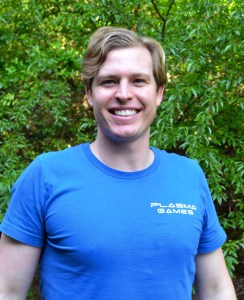
There is a problem in high school chemistry classrooms. It goes beyond limited funding or a textbook crisis. It’s something teachers must battle every day: a lack of engagement from students.
In a pilot study spanning 12 school districts, 48 schools, 71 teachers and 5,000 students in North Carolina, Raleigh’s Plasma Games found that 100% of teachers said engagement was their greatest concern. But Co-Founders Hunter Moore and Christophe Renaud also discovered that their product, the video game Sci-Ops: Global Defense, directly addressed that problem. With the game’s pilot program complete, Sci-Ops officially launched yesterday.
 Sci-Ops allows students to virtually save scientists and engineers from aliens while learning key chemistry concepts and exploring career options. It’s the first product from Plasma Games, which Moore and Renaud—who met while earning their MBAs at UNC’s Kenan-Flagler School—launched seven years ago. They wanted to focus first on chemistry because while it can be abstract to understand, mastering it leads to necessary and high-paying careers.
Sci-Ops allows students to virtually save scientists and engineers from aliens while learning key chemistry concepts and exploring career options. It’s the first product from Plasma Games, which Moore and Renaud—who met while earning their MBAs at UNC’s Kenan-Flagler School—launched seven years ago. They wanted to focus first on chemistry because while it can be abstract to understand, mastering it leads to necessary and high-paying careers.
“Chemistry is a subject that’s really hard to grasp and visualize,” Renaud said. “It’s one that leaves a lot of students behind, and it’s one that’s received no love and no attention from the textbook and other supplement industries to really help out and make this more attractive and more what you would expect. It’s 2019. Your phone has an infinite supply of really attractive entertainment, but if you want to learn chemistry, you still have to go to stodgy, old books—but they don’t even buy the books anymore.”
Moore said all 100% of the teachers they worked with wanted their product. Plasma Games is waiting on a piece of legislation in the NC House of Representatives which would roll the game out to 25 NC counties for $1.5 million. The eight-employee startup also won a National Science Foundation award in 2016 for $225,000.
“We’re not just a tool to help learning,” Moore said. “We want to help teachers engage students so they’re not burnt out and they can actually have real connections with students and make a difference.”
The majority of education technology focuses on kindergarten through sixth grade, Renaud said. Thus, a huge gap exists for these students who grew up learning on apps. Renaud also said this type of game can help rural students who might not have line of sight to an industrial hub to learn about the potential career paths of engineers and scientists, which are represented within the game by the scientists and engineers they are saving.

“We’re trying to make all this as real as possible,” Renaud said, “replicating real career paths, real growth, twists and turns in people’s career pathways that would get them to where they are and give them niche expertise because that’s where the world is going. We all become specialists. We can change what that is a little bit, but the world is composed of specialists, and we’re trying to give them a real view of that and tie it to the curriculum so you learn the concept and you see how it’s being used.”
Sci Ops: Global Defense intertwines chemistry concepts through the gameplay experience, including featuring facts from the periodic table in a player’s armor and frequency and wavelength in lasers. In addition to school use, Plasma Games also targets parents and homeschoolers in an effort to get more students involved in STEM careers and fill these workforce pipeline gaps.
Says Moore, “You look at what’s the biggest, most rapidly growing market and then what’s the biggest problem, because the premise is if you can identify that and you solve that problem, you will make the biggest impact on society. And that’s what the driver was behind this. Not only is that just a good thing altruistically, it’s also the mark of a good business because that’s where you can actually succeed and thrive and create jobs and be successful in your efforts.”
Renaud said global trends point to the need for Plasma Games as China takes up about half of the global education technology market and the United States fights to keep up. Moreover, Renaud and Moore said no one else in the world has anything like Plasma Games, which is situated well in the Triangle.
“We could be the international hub for game-based education because we have lots of game-based companies around here,” Moore said. “We also have lots of academic universities, so it’s really a perfect storm for a company like ours to really emerge as the global leader.”
Becoming a cultural phenomenon like the old-school video game Oregon Trail, which Renaud recalls fondly from his childhood school memories, is part of the vision and impact he and Plasma Games would like to have.
“I vividly remember playing it (Oregon Trail) back in the fourth grade,” Renaud said. “It was the coolest day of school. I would love for people to have that kind of experience with our game so that it permeates the consciousness enough that people are thinking about chemistry. They’re talking about chemistry. They’re thinking about the career opportunities behind this. So that’s what I hope that it gets out there and has that kind of presence and impact.”
